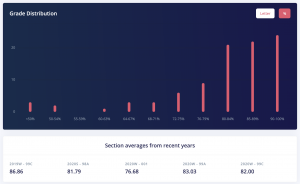This course is a great arts elective, however it is most likely not what you think it is. It is not a course that teaches strict grammatical rules vehemently challenging everyday speech and writing. Instead, it is focused on descriptive grammar: grammatically describing English used in everyday situations. In addition, it is a great choice for someone who does not like to attend lectures, as the whole course can be online and generally consists of readings with a couple videos.
I would recommend this course to those who are interested in understanding the rules behind everyday English use. For most of us, English use is intuitive; no thought about sentence structure is needed. However, if you want to understand how to make sense of our inherent intuition or you would like to be able to describe the English structure to someone learning English, this course is a great choice for you.
FORMAT OF THE COURSE
This was my first summer course, in 2020S, which took place over both summer semesters, making it more relaxed than most summer courses. Of course, it can also be taken in the Winter Semester. When I took it, the course grade was divided into 3 assignments/assessments over the course of 12 lessons:
- Journal entries (10%) – These normally consist of engaging or controversial questions such as whether there is a future tense in English. When I took the course, these were group assignments. Bringing friends can make it enjoyable, or you can meet interesting arts kids like I did.
- Exercises (10%) – These are exercises based on weekly online lessons. I found them very useful for acquiring a conceptual understanding needed for the tests. They are for completion.
- Tests (80%) – There are 3 tests: Test 1 and 2 (each 20%) are based on lessons 1-3 and 1-7, respectively. The final exam (30%) is not worth too much more than the tests, easing the pressure of the exam.
The 12 lessons are split into 4 units, which are meant to build up your understanding of grammar. This is done starting from words in sentences, and building up to clauses and analyzing modern-day uses of English.
GPA 🙂 OR 🙁
As long as you keep up with the lessons, you will do great (A+)! I found the most challenging part of the course was the journal entries, but with less weight on them, there is less pressure to do well. The exam question themes are given out beforehand and can help you narrow down your studying.
Here is the grade distribution from Winter 2020:

ENGL 321 Grade Distribution (Credits: ubcgrades.com)
VERDICT?
If you need an arts elective and would like to understand how English is built, then ENGL 321 will boost your GPA! It is also a great choice as there are no lectures and the weight is distributed on multiple assessments. For those who are not interested, there are many other arts electives out there, so no need to worry. Please let me know if you have any questions in the comments below! Enjoy the course.

